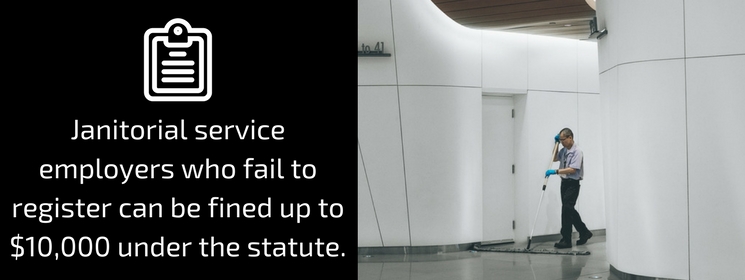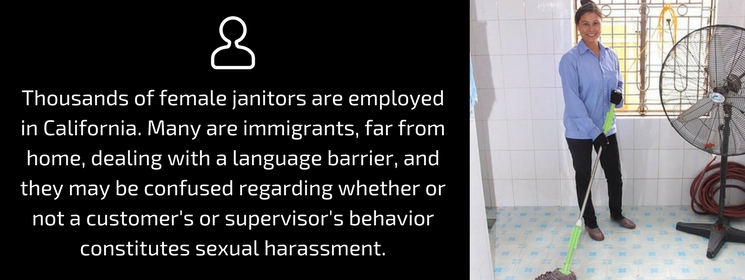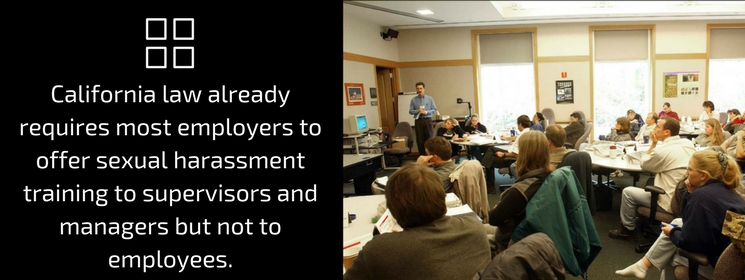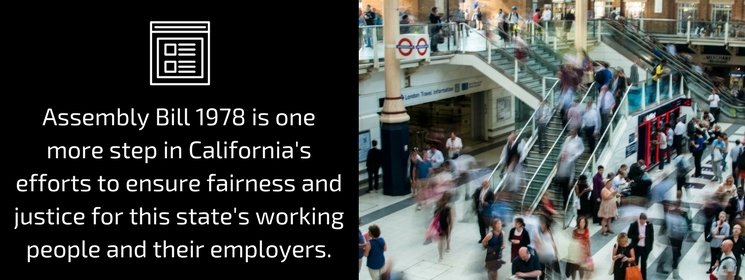Late last year, lawmakers in Sacramento approved – and Governor Jerry Brown signed – Assembly Bill 1978, making California the first state to adopt legislation aimed at protecting those employed in the janitorial industry against sexual harassment and assaults.
Training janitors how to protect themselves against such harassment and assaults at work is a central element of the new statute. It is estimated that more than 200,000 janitors are employed in the state of California.
Additionally each year under the new law, janitorial services in California now must register with the state’s Division of Labor Standards Enforcement and pay a registration fee of $500.
Janitorial service employers who fail to register can be fined up to $10,000 under the statute.
Assembly Bill 1978 also imposes fines on janitorial service contractors who don’t follow legal business practices, and it holds the contractors – as well as the owners of buildings where janitorial employees work – more accountable under the law.
The new legislation was introduced by State Assemblywoman Lorena Gonzalez of San Diego.
Assembly Bill 1978 was backed by a number of groups including the Service Employees International Union-United Service Workers West as well as the Maintenance Cooperation Trust Fund, a California “watchdog” organization committed to ending illegal practices in the janitorial industry.
The proposal was also supported by the California Chamber of Commerce, the California Automakers’ Wholesalers Association (CAWA), the Commercial Real Estate Development Association, the California Business Properties Association, the International Council of Shopping Centers, and the California affiliate of the National Federation of Independent Business.
WHY DOES ASSEMBLY BILL 1978 FOCUS SPECIFICALLY ON JANITORS?
Why should a law focus specifically on janitors? Thousands of female janitors are employed in California. Many are immigrants, far from home, dealing with a language barrier, and they may be confused regarding whether or not a customer’s or supervisor’s behavior constitutes sexual harassment.
Alejandra Valles, the secretary-treasurer of the Service Employees International Union-United Service Workers West, told Bloomberg BNA, “Offering qualitative training, versus having an HR person teach this, is precisely what the bill was crafted to do. It will empower the women, and most important, they will know where they can go for help.”
Sexual harassment and assault in the janitorial services industry came to public attention in 2015 when PBS aired the Frontline documentary titled “Rape on the Night Shift,” which focused on the dangers facing female janitorial employees.
Assemblywoman Gonzalez told PBS that she was moved to tears by the documentary. “This is assault and rape,” she said. “Obviously, it’s something we would never allow to happen, and we need to take the steps necessary to prevent it.”
San Francisco workplace harassment attorney Kenneth Frucht explains: “Two lawsuits filed by women who worked as janitors for a company that provided services to Genentech alleged that the women were assaulted and raped while working graveyard shifts.
The complaints allege sexual harassment by male superiors, and the failure to protect the women over a period spanning five years.
Janitorial workers in California are particularly vulnerable because many of them are immigrants, have difficulty with communicating in English, don’t know their rights and are fearful of losing their jobs if they confront their employers or harassers.”
Attorney Frucht further explains: The sensitive position of janitorial workers was implicitly acknowledged when Governor Jerry Brown signed Senate Bill 178 in September 2016.
The new law covers approximately 220,000 California janitorial employees, and authorizes the California Labor Commissioner to enact regulations to enforce the law.
Beginning July 1, 2018, janitorial employers will be required to register with the Labor Commissioner in order to conduct business in California, and by that date they must also provide employees with Department of Fair Employment and Housing pamphlets on sexual harassment.”
Attorney Frucht adds, “The new law also establishes fines for specific violations of its provisions. By enacting this law, the legislature has begun a much-needed process of educating both employees and employers in this employment sector on their rights and responsibilities related to prevention and remediation of harassment and discrimination in the workplace. Though this won’t eliminate these problems, it is one more tool that employees have to fight for a safe and harassment free workplace.”
Assembly Bill 1978 does not actually go into effect until mid-2018.
It requires employers to provide details regarding their janitorial services, disclose any legal actions taken against them, and provide a federal employer ID number or a state employer ID number.
Speaking for the Maintenance Cooperation Trust Fund, Lilia Garcia-Brower told Bloomberg BNA, “To the responsible business owner this will seem like common sense. But with the underground economy and fly-by-night contractors in California, that’s a big step forward.”
HOW HAS THE JANITORIAL INDUSTRY OPERATED IN THE PAST?
Since the 1970s, questionable business practices defined the janitorial service industry.
In a study of the janitorial business published in March 2016, the University of California Berkeley’s Center for Labor Research and Education reported, “A subcontracting system that awards contracts to the lowest bidder, the practice of operating ‘underground’ or off the books, and minimal profit margins all serve to keep wages low and hazards unchecked …. This industry dysfunction can also manifest itself in the form of sexual harassment and assault of janitors and security officers, often by their own supervisors.”
For several reasons, the risk of sexual harassment is high for janitors. Several layers of contractors and subcontractors tend to create less employer accountability.
Employees often work at night, in isolation, and many are women who do not speak English and may not have documentation.
This makes the reporting of harassment incidents less likely, because these women may fear retaliation or may lack a complete understanding of their legal rights as employees in California.
Assembly Bill 1978 governs California janitorial companies with at least one employee. It also covers janitors who work as independent contractors or as franchisees.
One provision of the law does not kick in until the year 2020.
That’s when janitorial service employers are required to start providing, at least once every two years, violence prevention and sexual harassment training.
California law already requires most employers to offer sexual harassment training to supervisors and managers but not to employees.
Assembly Bill 1978 also forbids any California business or entity from entering into a contract with an unregistered janitorial company.
Violators will face civil fines that could be as high as $25,000. Business leaders say that in spite of its good intentions, Assembly Bill 1978 will be a costly, time-consuming burden on employers.
“Every imposition on a business creates new costs for them, and new potential liability,” according to Ken DeVore, the legislative director for the National Federation of Independent Business California.
But DeVore also added, “We don’t believe there should be sexual harassment or assault in any workplace.”
WHAT ARE THE LEGAL RIGHTS OF WORKERS IN CALIFORNIA?
Employees are legally protected and have a number of rights in the state of California. This state’s wage-and-hour regulations, along with its other laws protecting employees, give workers in our state more legal protections than they receive in most other states.
A San Francisco workplace harassment attorney can provide advice and legal help if a California employer violates your right to:
- be paid for all hours worked
- be paid at least the state minimum wage
- be paid overtime and double time when you qualify
- rest and lunch breaks
- be reimbursed for work materials
- be paid by check with an itemized deduction statement
- immediate medical attention, paid for by the employer, if you are injured on the job
- health and safety equipment and training
- a workplace free of harassment and intimidation
If you are dealing with any type of harassment and intimidation at a California workplace, it needs to stop now. Californians do not tolerate employers who operate illegally, and our laws in this state express and reflect that commitment.
Assembly Bill 1978 is one more step in California’s efforts to ensure fairness and justice for this state’s working people and their employers.










